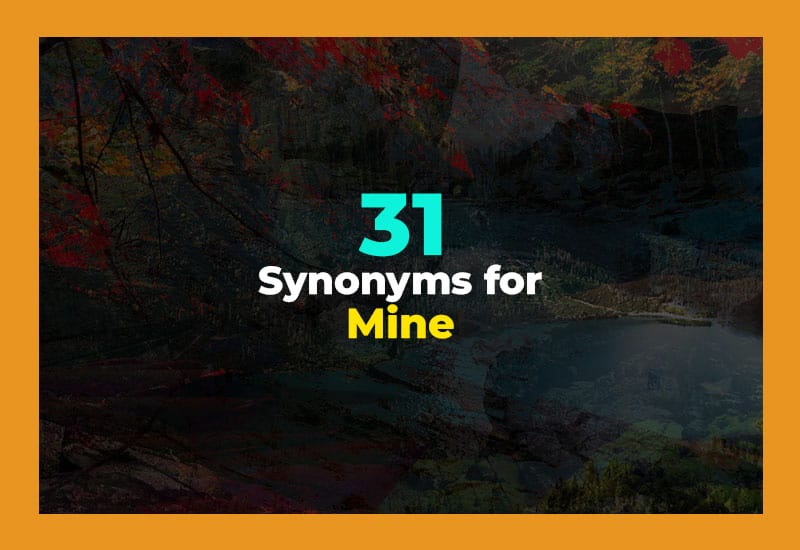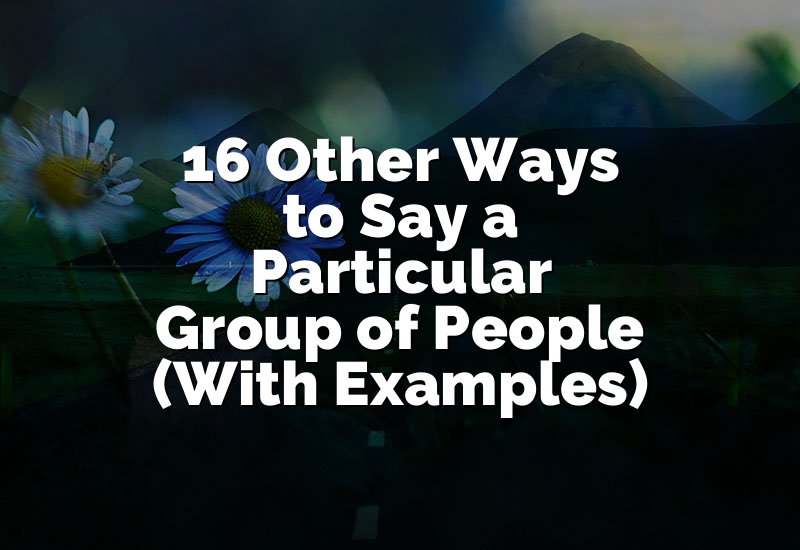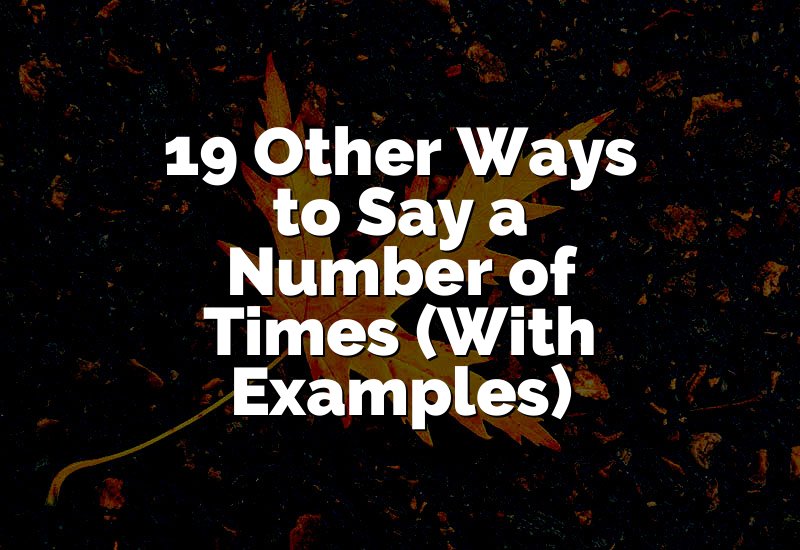You probably use the word ‘mine’ a lot without thinking about it. In this article, we will explore 31 fun synonyms for ‘mine’ that you can use in everyday talking. Words like ‘belonging’, ‘property’, and ‘possession’ are just a few examples.
| Synonym | Meaning | Example |
|---|---|---|
| Belonging | Something that belongs to someone | This book is my belonging, please don't take it. |
| Property | Something owned by someone | The house is her property. |
| Possession | Something you own | He kept the watch in his possession. |
| Estate | A large area owned by someone | They inherited a big estate from their grandfather. |
| Asset | Valuable thing someone owns | Her car is her biggest asset. |
| Holdings | Things someone owns | He sold his holdings to get cash. |
| Treasure | Something very valuable | The old coins are a treasure from his family. |
| Goods | Items owned by someone | The store sells many goods. |
| Effects | Personal belongings | She packed all her effects carefully. |
| Chattel | Personal property | All his chattel was listed in the will. |
| Wealth | Everything a person owns | They lost their wealth after the storm. |
| Fortune | Large amount of money or property | He inherited a fortune from his uncle. |
| Resources | Useful things someone owns | Farmers use natural resources to grow crops. |
| Holdings | Things kept or owned | The company has many holdings in the city. |
| Estate | Land and property owned | She manages her family estate well. |
| Possessions | Things owned by someone | He moved all his possessions to a new home. |
| Assets | Things of value | His assets include land and stocks. |
| Property | Something owned | Their property is near the river. |
| Effects | Personal things | Her effects were in a big suitcase. |
| Belongings | Things that belong to someone | All my belongings are in this bag. |
| Goods | Things for use or sale | The market sells local goods. |
| Treasures | Very valuable things | The treasures were hidden in a box. |
| Fortune | A lot of wealth | She made a fortune in business. |
| Wealth | Riches someone owns | His wealth grew after years of hard work. |
| Assets | Valuable possessions | The company increased its assets. |
| Holdings | Owned shares or property | He sold some of his holdings. |
| Estate | Large property | The old estate has many rooms. |
| Chattel | Movable property | Furniture is a type of chattel. |
| Resources | Supplies or wealth | They used all their resources wisely. |
| Possession | Ownership of something | He claimed possession of the land. |
| Belonging | Owned by someone | That bag is my belonging. |
Belonging
Belonging means something that is yours. It is used when you want to show ownership of an item. It can be something small, like a bag, or bigger, like a house. When you say something is your belonging, people know it is yours. Also, it feels personal and special because it shows a connection. You can use it in casual talking or writing to make your speech feel warm.
- This pen is my belonging.
- The jacket is her belonging.
- That old photo is our belonging.
Property
Property is anything you own. It can be land, a house, or even a car. People often use property when talking about legal ownership. It sounds official but can also be used in everyday life. Property shows that something belongs to you and nobody else. You can talk about selling, buying, or protecting your property. It is a strong word that shows your rights over things.
- The car is his property.
- They bought new property last year.
- She protects her property carefully.
Possession
Possession is when something is owned by someone. It can be a small item or something valuable. This word is common in both legal and casual speech. Possession shows that the thing is yours to use or keep. People often talk about losing or gaining possession. It also gives a clear idea of ownership when speaking about personal things.
- He lost possession of his phone.
- The painting is in her possession.
- They took possession of the land.
Estate
Estate means a large area or property that someone owns. It can include houses, land, and sometimes money. People often inherit estates from family. You can also manage or sell an estate. Talking about estates makes it clear that the ownership is big or important. It is also a fancy way to talk about property.
- She owns a big estate.
- The estate has beautiful gardens.
- They inherited the estate last year.
Asset
Asset is something valuable that you own. It can be money, a car, or even skills. People use this word to show importance or value. Having assets gives security and comfort. You can also buy, sell, or protect assets. In conversations, it sounds professional but also works casually. It shows that something belongs to you and has value.
- Her car is her main asset.
- He invested in valuable assets.
- Assets include houses and stocks.
Holdings
Holdings are things someone owns, often land or property. This word is common for companies or rich people. You can also use it for personal belongings, but usually bigger items. Holdings show that someone has control or responsibility over them. People often talk about selling or increasing their holdings. Using this word makes ownership sound organized and important.
- He sold some holdings last month.
- The company has many holdings.
- Their holdings include several houses.
Treasure
Treasure is something very valuable, often loved or special. It can be money, jewelry, or items with emotional meaning. People keep treasures safe because they are important. It can also be used for fun, like calling favorite things a treasure. Talking about treasure makes things feel precious. You can show care and pride when using this word.
- The gold coins are a treasure.
- That watch is my treasure.
- Childhood toys can be treasure.
Goods
Goods are things that are owned or made to sell. It can include food, clothes, or furniture. People use goods in markets, shops, or business. Goods can also be personal belongings. Talking about goods makes things feel useful or tradeable. You can also describe buying, selling, or moving goods. It shows that something belongs to someone in a practical way.
- The shop sells local goods.
- He packed the goods carefully.
- Their goods were shipped yesterday.
Effects
Effects are personal belongings or items that belong to someone. People often use this when moving or traveling. Effects can include clothes, books, or tools. It shows ownership in a polite and formal way. Effects can also mean things that matter or are important. Talking about effects gives a clear idea of your personal things.
- She packed all her effects.
- His effects were in boxes.
- Moving effects takes time.
Chattel
Chattel means personal property that can be moved. It includes items like furniture, animals, or vehicles. People often use this in legal or old-fashioned talking. Chattel shows clear ownership. You can sell or buy chattel. This word gives a formal feel to talking about personal belongings.
- The furniture is his chattel.
- They listed all chattel in the will.
- Cattle are considered chattel.
Wealth
Wealth is all the valuable things someone owns. It can include money, property, or resources. People talk about wealth to show richness or success. Wealth can be used personally or for a company. It shows ownership and the amount of things someone has. Talking about wealth also gives an idea of comfort and security.
- They lost their wealth.
- His wealth grew fast.
- Wealth includes houses and cars.
Fortune
Fortune is a large amount of money or property someone owns. People often inherit or earn a fortune. It can also mean luck sometimes. Fortune shows importance and value. Using fortune makes the word ‘mine’ sound exciting and big. People often dream of gaining fortune in life.
- He inherited a fortune.
- She made a fortune in business.
- His fortune increased yearly.
Resources
Resources are useful things someone owns. They can include money, land, or tools. People use resources to work, create, or live. Resources show that something belongs to you and can help in tasks. Talking about resources shows responsibility and planning. Using this word gives a smart way to explain what you own.
- Farmers use natural resources.
- She managed resources wisely.
- Their resources include land and machines.
Possessions
Possessions are all things someone owns. It can be small or big items. People often talk about possessions when moving or selling. Possessions show what belongs to you clearly. Using this word helps explain ownership politely. You can also describe taking care of your possessions.
- He moved his possessions.
- Her possessions are valuable.
- They lost all possessions.
Assets
Assets are valuable things someone owns. They include money, property, or equipment. People use assets in business or personal life. Assets show importance and ownership. Talking about assets can explain wealth or responsibility. Using this word makes ownership feel organized and professional.
- The company increased assets.
- Her assets include property.
- Assets can be sold or bought.
Belongings
Belongings are the things that belong to someone. It can be clothes, books, or bags. People often talk about belongings when moving or traveling. Belongings show personal ownership. Using this word makes speech feel friendly and clear. It also shows care for personal things.
- All my belongings are here.
- She packed her belongings.
- They lost their belongings.
Treasures
Treasures are very valuable things someone owns. It can be money, jewelry, or items with feelings attached. People often hide or protect treasures. Talking about treasures shows importance and love for something. Using treasures instead of mine gives excitement and emotion to speech.
- The box had treasures.
- He keeps treasures safe.
- Childhood treasures are special.

Final Thoughts
There are many words like ‘mine’ that show ownership. Using these synonyms makes talking about your things fun and interesting. You can try them in daily speech to sound more lively and personal. Each word adds a special feeling to your sentences.









